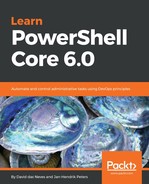Chapter 1, Current PowerShell Versions, introduces Windows PowerShell and PowerShell Core and gives you a general overview of the past, present, and future of PowerShell.
Chapter 2, PowerShell ISE Versus VSCode, compares the different editors that are capable of editing and executing PowerShell code. We compare PowerShell ISE and VSCode comprehensively; VSCode is the de facto successor to PowerShell ISE.
Chapter 3, Basic Coding Techniques, goes over the basics of PowerShell scripting, such as cmdlets, using the pipeline, and PowerShell's type system. We will look into different language keywords and operators to get you going.
Chapter 4, Advanced Coding Techniques, extends your knowledge by examining the performance of pipeline operations, enabling you to interact with web services and giving you full control of the formatting and type system that is built into PowerShell.
Chapter 5, Writing Reusable Code, introduces you to a set of best practices when developing code and demonstrates the use of functions and modules. We will start looking at version control systems and digitally signed code as well.
Chapter 6, Working with Data, shows you how to work with different kinds of data in PowerShell, from accessing the registry to developing a class and using JSON in your scripts.
Chapter 7, Understanding PowerShell Security, is an in-depth primer on security in PowerShell and the multitude of options that attackers and defenders have to make use of.
Chapter 8, Just Enough Administration, dives into a new feature of Windows PowerShell called Just Enough Administration, in order to apply role-based access control (RBAC) to products that do not have their own RBAC solution in place.
Chapter 9, DevOps with PowerShell, is short introduction to DevOps that focuses on what PowerShell can do to support DevOps scenarios with integrated unit testing and flexibility in a release pipeline.
Chapter 10, Creating Your Own PowerShell Repository, focuses on the package management capabilities of PowerShell by building a NuGet gallery from scratch and showing you how to work with external and internal package sources.
Chapter 11, VSCode and PowerShell Release Pipelines, concentrates on using PowerShell in a CI/CD context with a release pipeline for your code. We show you additional concepts around the pipeline, such as unit testing and source code management, as well as some helpful PowerShell modules.
Chapter 12, PowerShell Desired State Configuration, introduces you to a feature of Windows PowerShell that helps you greatly in following DevOps principles by giving you a way of defining infrastructure as code. We will examine the key components of DSC to prepare you for the deep dive in Chapter 17, PowerShell Deep Dives.
Chapter 13, Working with Windows, concentrates on the components of PowerShell that Windows administrators can leverage to maintain, troubleshoot, and tune their Windows operating system.
Chapter 14, Working with Azure, shows you the capabilities of PowerShell in a cloud context. We will look at how you can use PowerShell with Azure in DevOps and traditional IT scenarios alike.
Chapter 15, Connecting to Microsoft Online Services, goes one step further than the previous chapter and shows you how to connect to other hosted services, such as MSOL, as well, introducing you to Office 365, SharePoint Online, Exchange Online, and Microsoft Teams.
Chapter 16, Working with SCCM and SQL Server, introduces you to the ways of working with System Center Configuration Manager and SQL Server with PowerShell. We will not only dive into the built-in modules, but will also showcase great community-driven modules.
Chapter 17, PowerShell Deep Dives, concentrates on several scenarios that are either seldom used or that are not well documented, such as using DSC in a corporate environment, developing user interfaces in PowerShell, and improved debugging experiences.
